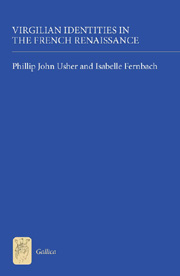Book contents
- Frontmatter
- Contents
- List of Illustrations
- Dedication
- Foreword
- List of Contributors
- Acknowledgements
- Note on Editions and Translations
- Introduction
- Part I Pastoral and Georgic Modes
- 1 Virgil and Marot: Imitation, Satire and Personal Identity
- 2 Virgil's Bucolic Legacy in Jacques Yver's Le Printemps d'Yver
- 3 On the Magical statues in lemaire de Belges's Le Temple d'honneur et de vertus
- 4 Temples of Virtue: Worshipping Virgil in Sixteenth-Century France
- 5 From Copy to Copia: Imitation and Authorship in Joachim Du Bellay's Divers Jeux Rustiques (1558)
- Part II The Epic Mode
- Index
- Already Published
5 - From Copy to Copia: Imitation and Authorship in Joachim Du Bellay's Divers Jeux Rustiques (1558)
from Part I - Pastoral and Georgic Modes
Published online by Cambridge University Press: 05 February 2013
- Frontmatter
- Contents
- List of Illustrations
- Dedication
- Foreword
- List of Contributors
- Acknowledgements
- Note on Editions and Translations
- Introduction
- Part I Pastoral and Georgic Modes
- 1 Virgil and Marot: Imitation, Satire and Personal Identity
- 2 Virgil's Bucolic Legacy in Jacques Yver's Le Printemps d'Yver
- 3 On the Magical statues in lemaire de Belges's Le Temple d'honneur et de vertus
- 4 Temples of Virtue: Worshipping Virgil in Sixteenth-Century France
- 5 From Copy to Copia: Imitation and Authorship in Joachim Du Bellay's Divers Jeux Rustiques (1558)
- Part II The Epic Mode
- Index
- Already Published
Summary
Joachim Du Bellay published his Divers Jeux rustiques upon his return to France, after a period of four years in Rome spent in the service of his uncle, Cardinal Jean du Bellay. The collection's eclecticism – it ranges from rustic poems to love poetry and satire – illustrates the various aspects of the author's poetry and has prompted comparison with Pierre de Ronsard's Bocage (1554) and Meslanges (1555). Together with the Regrets and the Antiquitez de Rome, also published in 1558, the Divers Jeux rustiques signalled Du Bellay's “rentrée littéraire” (return to literature), which carried with it hopes for a royal appointment at the court of henri II. The collection presents two distinctive aspects. Firstly, half of its forty poems, described by Henri Chamard as being the collection's most original, dwell on the rustic topos. Secondly, two thirds of the pieces are direct translations or imitations of Latin, neo-Latin, or Greek poetry. The opening text of the collection brings these two aspects together, for “Le Moretum de Virgile” (Virgil's “Moretum”) is a fairly scrupulous translation of a Latin poem attributed to (pseudo-)Virgil and which details a ploughman preparing his meal. In what follows, I contend that Du Bellay's recourse to georgicism in the “Moretum” (a) expresses a critique of court culture, which further resounds throughout the general architecture of the Divers Jeux rustiques, and (b) makes a plea for the poet's own position at court, following his difficult return from Rome.
- Type
- Chapter
- Information
- Virgilian Identities in the French Renaissance , pp. 93 - 114Publisher: Boydell & BrewerPrint publication year: 2012



